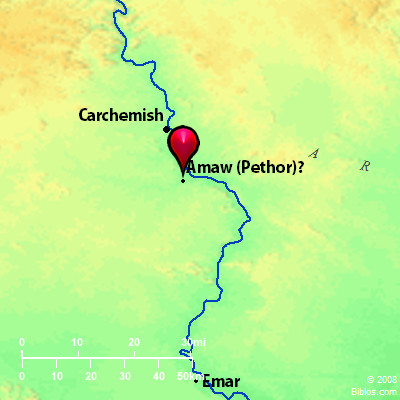Atlas  Pethor and surrounding area Maps Created using Biblemapper 3.0 Additional data from OpenBible.info Occurrences Numbers 22:5 He sent messengers to Balaam the son of Beor, to Pethor, which is by the River, to the land of the children of his people, to call him, saying, "Behold, there is a people who came out from Egypt. Behold, they cover the surface of the earth, and they are staying opposite me.Numbers 22:7 The elders of Moab and the elders of Midian departed with the rewards of divination in their hand; and they came to Balaam, and spoke to him the words of Balak. Numbers 22:8 He said to them, "Lodge here this night, and I will bring you word again, as Yahweh shall speak to me." The princes of Moab stayed with Balaam. Numbers 22:10 Balaam said to God, "Balak the son of Zippor, king of Moab, has sent to me, saying, Numbers 22:11 'Behold, the people that is come out of Egypt, it covers the surface of the earth: now, come curse me them; perhaps I shall be able to fight against them, and shall drive them out.'" Numbers 22:14 The princes of Moab rose up, and they went to Balak, and said, "Balaam refuses to come with us." Numbers 22:21 Balaam rose up in the morning, and saddled his donkey, and went with the princes of Moab. Deuteronomy 23:4 because they didn't meet you with bread and with water in the way, when you came forth out of Egypt, and because they hired against you Balaam the son of Beor from Pethor of Mesopotamia, to curse you. Encyclopedia PETHORpe'-thor (pethor; Phathoura, Bathoura): The dwelling-place of Balaam, situated on "the river" (the Euphrates) (Numbers 22:5).13). This is Paradise restored. We have sure ground for the expectancy; the last two chapters of Re contain the prophetic fulfillment: "And I saw a new heaven and a new earth: for the first heaven and the first earth are passed away; and the sea is no more." The accomplishment of these sublime predictions will involve a fundamental change in the constitution of the globe. Life would be impossible if the sea was no more. But He who made the world can surely recreate it, clearing it of every vestige of sin and misery and imperfection, fitting it for the dwelling of perfect beings and of His supreme glory. Immanuel will dwell with the holy inhabitants of the new earth and in the new Jerusalem which is to descend into the glorified planet. John is bidden, "Write, for the predictions are faithful and true; they shall not fail to come to pass." PETHOR, this is the city of Balaam the prophet. Its name has been found associated, upon an Assyrian tablet, with that of Carchemish. It was a Hittite city, perhaps 60 ms. s. of Carchemish at Balis where there was "the tower of Balaam" in Asher Dan 1160. The only references are in Numb. 22:5 and Deut. 23:4. Strong's Hebrew H6604: Pthowrhome of Balaam |



